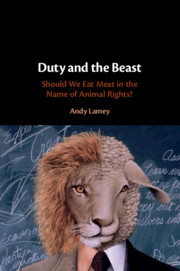Book contents
- Duty and the Beast
- Duty and the Beast
- Copyright page
- Contents
- Acknowledgments
- Introduction: The New Animal Debate
- Chapter 1 The Case for Animal Protection
- Chapter 2 A View to a Kill
- Chapter 3 Burger Veganism
- Chapter 4 The Dinner of Double Effect
- Chapter 5 Killing Them Softly
- Chapter 6 What Is It Like to Be a Chicken?
- Chapter 7 The Logic of the Larder
- Chapter 8 Thinking Like a Plant
- Chapter 9 Long Live the New Flesh
- Bibliography
- Index
Introduction: The New Animal Debate
Published online by Cambridge University Press: 25 March 2019
- Duty and the Beast
- Duty and the Beast
- Copyright page
- Contents
- Acknowledgments
- Introduction: The New Animal Debate
- Chapter 1 The Case for Animal Protection
- Chapter 2 A View to a Kill
- Chapter 3 Burger Veganism
- Chapter 4 The Dinner of Double Effect
- Chapter 5 Killing Them Softly
- Chapter 6 What Is It Like to Be a Chicken?
- Chapter 7 The Logic of the Larder
- Chapter 8 Thinking Like a Plant
- Chapter 9 Long Live the New Flesh
- Bibliography
- Index
Summary
Animal rights and related notions of animal protection have long been thought to entail a plant-based diet. An increasingly popular view in the animal ethics debate challenges this idea by arguing that even if animals warrant a high degree of moral standing we are permitted or even obliged to eat meat. Some arguments to this effect maintain that greater harms accrue to animal in plant agriculture than in certain forms of free-range animal husbandry. Others cite a loss in value that would occur if animals raised for food no longer existed. Still other arguments for ethical omnivorism cite new technologies such as humane slaughter systems, which are said to painlessly kill animals in a manner consistent with Peter Singer's philosophy of animal liberation, or in vitro meat, which is sourced in a petri dish rather than the body of a living animal. Finally some philosophers invoke plant "neurobiology" to challenge the possibility of not eating sentient beings. Despite their differences these arguments all defend a new omnivorism, one that justifies eating meat within a framework of animal protection.
- Type
- Chapter
- Information
- Duty and the BeastShould We Eat Meat in the Name of Animal Rights?, pp. 1 - 16Publisher: Cambridge University PressPrint publication year: 2019

